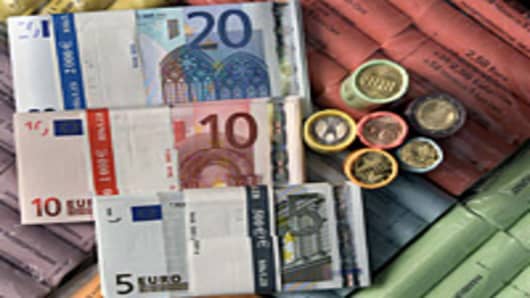Like stocks, the euro has so far this year shrugged off the so-called wall of worry. Concerns that the likes of Greece, Ireland or Portugal could default have not led to euro losses.
"No doubt part of the euro's strength reflects offsetting support from other forces," Jonathan Loynes, the chief European economist at Capital Economics in London wrote in a research note.
The ECB's hawkish tone on rates has been a major support for the euro against the greenback but also investors are now questioning whether a peripheral default would actually mean someone leaving the euro zone, according to Loynes.
"The euro's immunity also suggests that increased default risk has not been translated into increased euro zone break-up risk," he wrote.
"Meanwhile, the fact that implied default risks in bigger economies like Spain have, by contrast, been falling may also have helped," Loynes added.
Oh No, A Wall of Worry
But the euro's recent resilience in the face of so many worries may not last, Loynes warned.
"We are not convinced that these forces will last. The influence of higher interest rates could reverse if the markets start to worry that an over-hawkish ECB will stamp too hard on the economy," he explained.
Whether it will be possible to have so-called orderly defaults given uncertainty over haircuts for investors is another issue for Loynes, who refused to rule out a contagion risk from Portugal.
"The recent heightened problems in Portugal have increased the risk that contagion effects drag Spain closer to the crisis, with potentially huge market consequences," he wrote.
Loynes could not rule out further gains for the euro in the near-term but he added that this cannot last forever.
"We still believe that the ever-deepening crisis in the euro zone must eventually start to weaken the single currency," he said.



